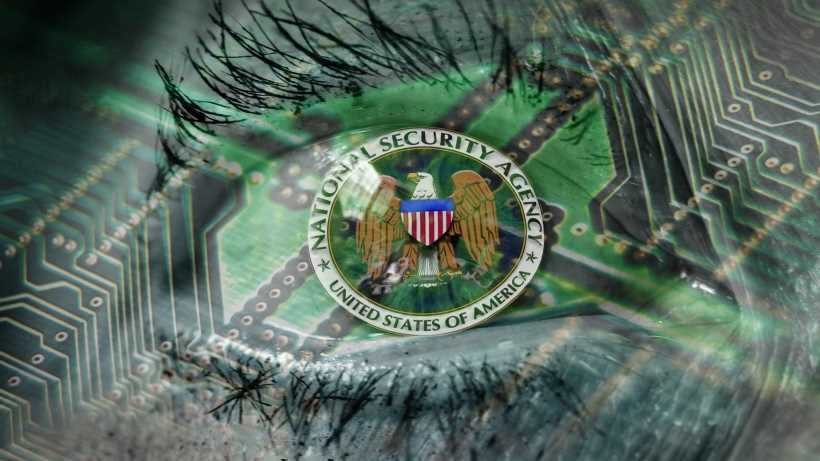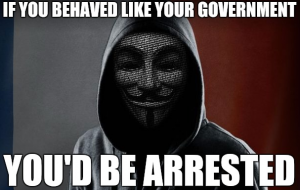
The Feds Just Indicted a Man for Behaving Exactly Like the Feds
Written by Carey Wedler
A few years ago, a popular meme asserted that:
“if you behaved like your government, you’d be arrested.”

A recent 16-count indictment issued by the Department of Justice against an Ohio man proves just that. The feds just indicted A man for behaving exactly like the feds
In a press release issued Wednesday, the DOJ announced it had indicted 28-year-old computer programmer Phillip R. Durachinsky for hacking “thousands of computers for more than 13 years in order to watch, listen to, and obtain personal data from unknowing victims.”
Durachinsky is alleged to have “orchestrated a scheme to access thousands of protected computers owned by individuals, companies, schools, a police department, and the government, including one owned by a subsidiary of the U.S. Department of Energy.”
The government claims he “developed computer malware later named ‘Fruitfly’ that he installed on computers and that enabled him to control each computer by accessing stored data, uploading files, taking and downloading screenshots, logging a user’s keystrokes, and turning on the camera and microphone to surreptitiously record images and audio. “
Further:
“Durachinsky used the malware to steal the personal data of victims, including their logon credentials, tax records, medical records, photographs, banking records, Internet searches, and potentially embarrassing communications. According to the indictment, Durachinsky used stolen logon credentials to access and download information from third-party websites.”
Durachinsky is further alleged to have watched and listened to victims without their knowledge or permission and intercepted oral communications taking place in the room where the infected computer was located.
Does any of this sound familiar? It should. The same federal government prosecuting the Ohio hacker has failed to prosecute its own agencies for doing the exact same things.
In one example, it’s worth noting that Durachinsky is facing child pornography charges, though the DOJ did not disclose specifically why. However, it’s also worth noting that the FBI has directly operated child pornography sites on multiple occasions… in the name of stopping child pornography.
However, the crux of charges against Durachinsky aligns more closely with the surveillance and activities of multiple government agencies.
Thanks to leaks by whistleblower Edward Snowden, it is public knowledge that the NSA has repeatedly violated fundamental rights to “watch, listen to, and obtain personal data from unknowing victims,” in the words of the DOJ in their indictment of Durachinsky.
In 2014, the New York Times reported that the NSA had “implanted software in nearly 100,000 computers around the world that allows the United States to conduct surveillance on those machines.” Further, the outlet noted, “the N.S.A. has increasingly made use of a secret technology that enables it to enter and alter data in computers even if they are not connected to the Internet.”
According to releases from Wikileaks, the CIA can also remotely access computers (and also spies on other agencies).
The NSA has also been revealed to be in possession of hacking tools, which it failed to secure. These tools ended up in the hands of other hackers.
The NSA has been exposed for granting itself remote access to cell phones and their microphones and cameras – even when the devices are turned off.
Using programs like PRISM, “the NSA bulk collect[s] internet communications from companies like Google, Apple, and Facebook,” Gizmodo summarized, explaining further that the program gave the agency “access to a vast amount of data, from records of Skype calls and Gchat logs to unflattering unposted selfies.”
XKeyscore, another spying program, covers “’nearly everything a typical user does on the internet,’” including the content of emails, websites visited and searches, as well as their metadata,” the Guardian reported in 2013, directly citing a presentation from the agency. “Analysts can also use XKeyscore and other NSA systems to obtain ongoing ‘real-time’ interception of an individual’s internet activity,” the outlet explained.
Much of the agency’s spying is approved under Section 702 of the Foreign Intelligence Surveillance Act, which also sweeps up communications of American citizens. Congress just approved a six-year extension of the controversial policy, declining to reform it despite widespread pleas.
The NSA can access medical records and has also monitored international banking transactions.
Despite the extensive privacy violations contained in these practices, no one within the government has been prosecuted — not even former Director of National Intelligence James Clapper, who misled the public about these activities. The USA Freedom Act, passed in 2015, purported to curtail surveillance but left many of these programs intact.
Yet First Assistant U.S. Attorney Sierleja of the Department of Justice said of Durachinsy:
“This defendant is alleged to have spent more than a decade spying on people across the country and accessing their personal information.”
“For more than 13 years, Phillip Durachinsky allegedly infected with malware the computers of thousands of Americans and stole their most personal data and communications,” said Acting Assistant Attorney General Cronan. “This case is an example of the Justice Department’s continued efforts to hold accountable cybercriminals who invade the privacy of others and exploit technology for their own ends.”
So far, the only action the DOJ has taken in relation to the government’s sweeping surveillance and hacking practices is to attempt to demonize and cage those who reveal the information.
This isn’t to suggest that Durachinsky was justified in hacking the private information and devices of unwitting individuals (or allegedly producing or facilitating child porn) — to the contrary. His case serves as a damning demonstration of the government’s power that when it receives an exemption on morality and accountability simply because it claims forcible authority through its institutions — whether it is conducting spying, killing, or theft.

 My First Amazing Ayahuasca Experience
My First Amazing Ayahuasca Experience  Pine Needle Tea
Pine Needle Tea  The REAL Controllers of Humanity: The Papal Bloodlines
The REAL Controllers of Humanity: The Papal Bloodlines  Is it Global Warming or Cooling?
Is it Global Warming or Cooling?  Gun Rights and Obama Examined
Gun Rights and Obama Examined